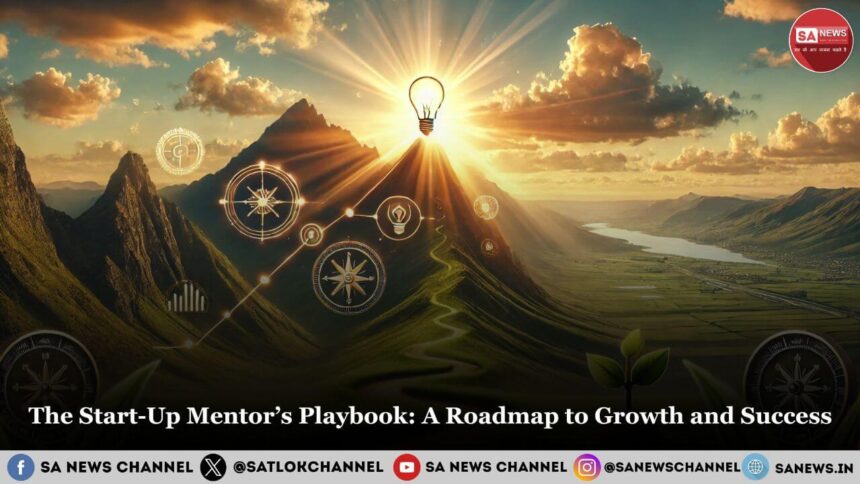Start-ups face a challenging journey. They must navigate funding, market entry, growth strategies, and operational efficiency, often with limited resources. This is where mentorship programs play a critical role. A well-structured mentorship program provides guidance, industry insights, networking opportunities, and emotional support, increasing a start-up’s chances of survival and success.
- 1. What Is a Start-Up Mentorship Program?
- 2. Why Are Start-Up Mentorship Programs Important?
- 2.1. High Failure Rate of Start-Ups
- 2.2. Faster Growth and Better Decision-Making
- 2.3. Access to Networks
- 2.4. Psychological and Emotional Support
- 3. Types of Start-Up Mentorship Programs
- 3.1. Accelerator-Based Mentorship
- 3.2. Incubator-Based Mentorship
- 3.3. Corporate Mentorship Programs
- 3.4. University-Led Mentorship Programs
- 3.5. Government-Supported Mentorship Programs
- 3.6. Independent and Peer Mentorship Programs
- 4. How to Choose the Right Mentorship Program
- 4.1. Define Your Goals
- 4.2. Consider Industry Relevance
- 4.3. Evaluate Track Record
- 4.4. Assess Structure and Commitment
- 4.5. Understand Funding Terms
- 5. Benefits of Start-Up Mentorship Programs
- 5.1. Improved Business Strategy
- 5.2. Access to Funding Opportunities
- 5.3. Skill Enhancement
- 5.4. Increased Credibility
- 5.5. Risk Mitigation
- 6. Challenges and Limitations of Mentorship Programs
- 6.1. Quality of Mentorship Varies
- 6.2. Over-Reliance on Mentors
- 6.3. Time and Resource Constraints
- 6.4. Equity and Funding Trade-Offs
- 6.5. One-Size-Fits-All Approach
- 7. Best Practices for Start-Ups in Mentorship Programs
- 7.1. Be Proactive
- 7.2. Build Relationships, Not Transactions
- 7.3. Apply Selective Advice
- 7.4. Set Clear Goals
- 7.5. Keep Learning and Adapting
- 8. Case Studies of Successful Start-Ups with Mentorship
- 9. Future of Start-Up Mentorship Programs
- 9.1. AI-Driven Mentorship
- 9.2. Virtual and Global Mentorship
- 9.3. Industry-Specific Mentorship Growth
- 9.4. Increased Corporate Involvement
- 10. How to Build a Start-Up Mentorship Program
- 10.1. Define the Program’s Objective
- 10.2. Recruit High-Quality Mentors
- 10.3. Establish a Structured Framework
- 10.4. Match Mentors and Mentees Effectively
- 10.5. Provide Continuous Support and Training
- 10.6. Measure Program Success
- 11. Role of Technology in Mentorship Programs
- 11.1. AI-Driven Mentor Matching
- 11.2. Virtual Mentorship Platforms
- 11.3. Data-Driven Decision Making
- 11.4. Blockchain for Mentor Verification
- 12. Common Pitfalls in Start-Up Mentorship Programs
- 12.1. Lack of Mentor Accountability
- 12.2. Mentee Over-Reliance on Mentors
- 12.3. One-Sided Relationships
- 12.4. Poorly Defined Outcomes
- 13. Government and Policy Support for Start-Up Mentorship
- 13.1. Grants and Funding for Mentorship Programs
- 13.2. Public-Private Partnerships (PPP)
- 13.3. Regulatory Support for Mentorship Ecosystems
- 14. Cultural Influence on Mentorship Approaches
- 14.1. Western vs. Eastern Mentorship Models
- 14.2. Peer-Led Mentorship in Emerging Markets
- 14.3. Family Business Mentorship vs. Start-Up Mentorship
- 15. The Future of Start-Up Mentorship
- 15.1. AI-Powered Personalized Mentorship
- 15.2. Decentralized and Community-Led Mentorship
- 15.3. Industry-Specific Deep Mentorship
- 15.4. Gamification of Mentorship
- Conclusion
- Beyond Success: The Ultimate Mentorship for Life
This article explores the significance of start-up mentorship programs, their structure, benefits, challenges, and best practices.
1. What Is a Start-Up Mentorship Program?
A start-up mentorship program is an initiative designed to connect early-stage entrepreneurs with experienced professionals who provide guidance, knowledge, and support. These programs can be run by government agencies, universities, corporations, incubators, or independent organizations.
Key Elements of a Mentorship Program:
- Mentors – Industry experts, investors, or experienced entrepreneurs.
- Mentees – Start-up founders or teams seeking guidance.
- Structured Support – Regular meetings, workshops, and resources.
- Networking Opportunities – Access to investors, partners, and customers.
- Skill Development – Business strategy, marketing, finance, legal matters, and operations.
2. Why Are Start-Up Mentorship Programs Important?
2.1. High Failure Rate of Start-Ups
Studies show that nearly 90% of start-ups fail. Common reasons include poor market fit, cash flow issues, and lack of experience. Mentorship programs address these gaps by offering strategic advice and practical insights.
2.2. Faster Growth and Better Decision-Making
Mentored start-ups grow faster than those without guidance. They make informed decisions, avoid common pitfalls, and capitalize on opportunities more effectively.
2.3. Access to Networks
A strong mentor provides access to a valuable network of investors, customers, and partners, which can be instrumental in scaling a business.
2.4. Psychological and Emotional Support
Entrepreneurship is stressful. Mentors provide emotional support, helping founders stay resilient during tough times.
3. Types of Start-Up Mentorship Programs
3.1. Accelerator-Based Mentorship
Accelerators like Y Combinator and Techstars offer structured mentorship as part of their programs. These programs provide funding, training, and networking opportunities within a fixed timeframe.
Examples:
- Y Combinator (USA) – 3-month program with intense mentorship and funding.
- Techstars (Global) – Focuses on hands-on mentorship and industry-specific guidance.
3.2. Incubator-Based Mentorship
Incubators provide long-term mentorship along with office space and infrastructure. Unlike accelerators, they don’t operate on a fixed schedule.
Examples:
- 500 Startups (Global) – Offers mentorship alongside funding and networking.
- T-Hub (India) – India’s largest incubator supporting tech start-ups.
3.3. Corporate Mentorship Programs
Corporations mentor start-ups to foster innovation and create business synergies. These programs often focus on industry-specific guidance.
Examples:
- Google for Startups – Provides mentorship, tools, and networking.
- Microsoft for Startups – Offers cloud resources and technical mentorship.
3.4. University-Led Mentorship Programs
Universities run mentorship programs to support student entrepreneurs by connecting them with faculty members, alumni, and industry experts.
Examples:
- Stanford StartX – A non-profit accelerator offering mentorship.
- IIT Madras Incubation Cell – Supports student and faculty-led start-ups in India.
3.5. Government-Supported Mentorship Programs
Governments run mentorship initiatives to promote entrepreneurship and economic development.
Examples:
- Startup India Hub – Indian government initiative offering mentorship.
- SBA Mentor-Protégé Program (USA) – Supports small businesses through structured mentorship.
3.6. Independent and Peer Mentorship Programs
These programs are run by experienced entrepreneurs or non-profits. They focus on one-on-one guidance or peer-based learning.
Examples:
- Founder Institute – Offers structured mentorship and training.
- TiE Global Mentorship – Connects entrepreneurs with seasoned business leaders.
4. How to Choose the Right Mentorship Program
4.1. Define Your Goals
Start-ups should identify what they seek—funding, industry insights, networking, or technical support. Different programs specialize in different areas.
4.2. Consider Industry Relevance
Industry-specific mentors understand market dynamics better and provide tailored advice.
4.3. Evaluate Track Record
Research the program’s success stories and mentor quality. A program with successful alumni is a strong indicator of effectiveness.
4.4. Assess Structure and Commitment
Some programs require significant time commitment. Founders should ensure the structure aligns with their availability and business needs.
4.5. Understand Funding Terms
Accelerators and incubators often take equity in exchange for funding. Start-ups should evaluate the trade-off before joining.
5. Benefits of Start-Up Mentorship Programs
5.1. Improved Business Strategy
Mentors help refine business models, identify market gaps, and develop effective go-to-market strategies.
5.2. Access to Funding Opportunities
Many mentorship programs connect start-ups with angel investors, venture capitalists, and grant opportunities.
5.3. Skill Enhancement
Entrepreneurs gain practical knowledge in finance, marketing, product development, and leadership.
5.4. Increased Credibility
Being associated with a reputed mentorship program boosts a start-up’s credibility, making it more attractive to investors and customers.
5.5. Risk Mitigation
Mentors help start-ups avoid costly mistakes, improving long-term sustainability.
6. Challenges and Limitations of Mentorship Programs
6.1. Quality of Mentorship Varies
Not all mentors provide valuable insights. Some may lack relevant experience or industry knowledge.
6.2. Over-Reliance on Mentors
Some founders become too dependent on mentors, delaying decision-making and innovation.
6.3. Time and Resource Constraints
Start-ups must balance mentorship commitments with core business operations.
6.4. Equity and Funding Trade-Offs
Some programs take a stake in the company, which may not always be favorable for founders.
6.5. One-Size-Fits-All Approach
Some programs follow a rigid structure that may not suit every start-up’s needs.
7. Best Practices for Start-Ups in Mentorship Programs
7.1. Be Proactive
Founders should actively seek advice, ask questions, and implement feedback.
7.2. Build Relationships, Not Transactions
Effective mentorship is based on long-term relationships, not just short-term advice.
7.3. Apply Selective Advice
Not all advice will be relevant. Founders should critically evaluate mentor recommendations.
7.4. Set Clear Goals
Start-ups should define what they want from mentorship—funding, strategy, networking, or skills development.
7.5. Keep Learning and Adapting
Business landscapes change. Entrepreneurs should continuously learn from mentors and market dynamics.
8. Case Studies of Successful Start-Ups with Mentorship
8.1. Airbnb (Y Combinator)
Airbnb joined Y Combinator in 2009. Mentorship from Paul Graham helped refine its business model, leading to global success.
8.2. Dropbox (Y Combinator)
Dropbox’s participation in Y Combinator provided crucial mentorship that helped them scale efficiently.
8.3. Ola (Startup India & TiE Mentorship)
Ola benefited from mentorship through Indian entrepreneurship programs, enabling its rapid growth in the ride-hailing market.
9. Future of Start-Up Mentorship Programs
9.1. AI-Driven Mentorship
Artificial intelligence will enhance personalized mentorship, offering data-driven insights and automated guidance.
9.2. Virtual and Global Mentorship
Remote mentorship will expand access, connecting start-ups with global experts.
9.3. Industry-Specific Mentorship Growth
More specialized mentorship programs will emerge, catering to deep-tech, health-tech, and fintech start-ups.
9.4. Increased Corporate Involvement
Large corporations will invest more in start-up mentorship, fostering innovation within their ecosystems.
10. How to Build a Start-Up Mentorship Program
For organizations, investors, and incubators looking to establish a mentorship program, careful planning is essential. A well-structured program must be sustainable, impactful, and scalable.
10.1. Define the Program’s Objective
Clearly outline the purpose of the program. Common objectives include:
- Supporting early-stage start-ups in a specific industry.
- Helping underrepresented entrepreneurs access resources.
- Strengthening local or national start-up ecosystems.
10.2. Recruit High-Quality Mentors
A strong mentorship program depends on experienced mentors with relevant industry knowledge. Selection criteria should include:
- Proven track record in building or scaling businesses.
- Willingness to commit time and effort.
- Ability to provide actionable, practical advice rather than generic guidance.
10.3. Establish a Structured Framework
An unstructured mentorship program can lead to inconsistent experiences. Effective programs include:
- Regular Check-Ins – Scheduled one-on-one or group meetings.
- Resource Access – Business tools, templates, and training materials.
- Goal Setting – Defined milestones and success metrics for mentees.
10.4. Match Mentors and Mentees Effectively
Mentor-mentee alignment is crucial for successful relationships. Consider:
- Industry Relevance – Matching mentors from the same field.
- Personality Fit – Ensuring compatibility in working styles.
- Skill Gap Bridging – Connecting mentees with mentors who fill their knowledge gaps.
10.5. Provide Continuous Support and Training
Mentorship effectiveness improves when mentors themselves receive guidance. Programs should include:
- Training on mentorship best practices.
- Regular mentor meet-ups to discuss challenges and share experiences.
- Feedback mechanisms to refine mentorship approaches.
10.6. Measure Program Success
To assess impact and improve over time, mentorship programs should track:
- Start-up survival rates post-mentorship.
- Revenue growth and funding secured by mentored start-ups.
- Satisfaction levels from both mentors and mentees.
11. Role of Technology in Mentorship Programs
Technology has transformed how mentorship programs operate, making mentorship more accessible and efficient.
11.1. AI-Driven Mentor Matching
Artificial Intelligence (AI) helps match mentors and mentees based on skills, experience, and goals. Platforms like LinkedIn and Founder Institute use AI-driven recommendations to improve compatibility.
11.2. Virtual Mentorship Platforms
With remote work trends, virtual mentorship programs have become more effective through platforms like:
- MentorCruise – A digital marketplace for mentorship.
- MicroMentor – A global mentorship network connecting entrepreneurs with business experts.
11.3. Data-Driven Decision Making
Start-ups and mentorship programs use analytics to track mentorship effectiveness. Data insights help identify:
- Which types of guidance lead to the best results.
- Common challenges start-ups face.
- Areas where mentees need more focused support.
11.4. Blockchain for Mentor Verification
Blockchain technology is being explored to verify mentor credentials, ensuring quality and credibility in mentorship programs.
12. Common Pitfalls in Start-Up Mentorship Programs
Even well-designed programs can fail if they do not address common challenges.
12.1. Lack of Mentor Accountability
Some mentors sign up but do not actively engage. Programs must ensure:
- Regular mentor performance reviews.
- Clear expectations and responsibilities from the start.
- Incentives for mentors, such as recognition or networking benefits.
12.2. Mentee Over-Reliance on Mentors
Start-ups should not expect mentors to make decisions for them. Programs should:
- Encourage mentees to take ownership of their decisions.
- Teach mentees how to critically evaluate advice.
12.3. One-Sided Relationships
Good mentorship is a two-way street. Mentors should also gain insights from mentees, particularly about emerging technologies and market trends.
12.4. Poorly Defined Outcomes
Without clear goals, mentorship sessions can become unproductive. Programs should:
- Set SMART (Specific, Measurable, Achievable, Relevant, Time-bound) goals.
- Regularly assess mentee progress.
13. Government and Policy Support for Start-Up Mentorship
Governments play a crucial role in fostering mentorship through funding, regulatory support, and policy-making.
13.1. Grants and Funding for Mentorship Programs
Governments offer financial incentives to organizations running mentorship programs. Examples include:
- EU Horizon Europe Program – Funds mentorship and innovation initiatives.
- Startup India Seed Fund – Provides early-stage funding and mentorship support.
13.2. Public-Private Partnerships (PPP)
Governments collaborate with corporations and universities to expand mentorship reach. Successful models include:
- Singapore’s Startup SG Founder Program – A mix of government and industry-led mentorship.
- UK Innovate Mentorship Program – Connects start-ups with business leaders.
13.3. Regulatory Support for Mentorship Ecosystems
Some governments create policies that encourage structured mentorship, such as:
- Tax incentives for companies offering mentorship.
- Legal frameworks to protect intellectual property shared in mentorship programs.
14. Cultural Influence on Mentorship Approaches
Mentorship styles vary across different regions due to cultural differences in communication, leadership, and business practices.
14.1. Western vs. Eastern Mentorship Models
- Western Approach (USA, Europe) – Focuses on structured, data-driven mentorship with defined goals and accountability.
- Eastern Approach (Asia, Middle East) – Often relationship-driven, emphasizing long-term guidance and personal trust.
14.2. Peer-Led Mentorship in Emerging Markets
Countries with limited access to experienced mentors rely on peer-led mentorship models, where entrepreneurs support each other.
14.3. Family Business Mentorship vs. Start-Up Mentorship
In regions with strong family business traditions (e.g., India, China, Middle East), mentorship is often informal within family networks, contrasting with structured start-up mentorship programs.
15. The Future of Start-Up Mentorship
The mentorship landscape is evolving. Future trends include:
15.1. AI-Powered Personalized Mentorship
AI will offer real-time, customized mentorship advice based on start-up progress and challenges.
15.2. Decentralized and Community-Led Mentorship
Rather than centralized programs, start-up communities will create decentralized mentorship networks using digital platforms.
15.3. Industry-Specific Deep Mentorship
More programs will focus on niche industries, offering highly specialized guidance in fields like biotech, climate-tech, and space-tech.
15.4. Gamification of Mentorship
Some platforms are incorporating gamification, where mentees earn rewards for progress, increasing engagement in mentorship programs.
Conclusion
Start-up mentorship programs are no longer optional—they are critical for business success. Whether driven by governments, corporations, universities, or independent networks, structured mentorship significantly improves a start-up’s chances of survival and growth.
With advancements in AI, virtual mentorship, and decentralized networks, mentorship programs will continue to evolve, making high-quality guidance more accessible to entrepreneurs worldwide.
For aspiring entrepreneurs, the key takeaway is clear: seek mentorship early, be proactive, and apply the guidance strategically to scale and sustain your business.
Beyond Success: The Ultimate Mentorship for Life
A start-up’s journey mirrors life itself—filled with challenges, guidance, and the pursuit of success. Just as mentorship accelerates business growth, spiritual mentorship elevates human life. Wealth, fame, and achievements are temporary, but true fulfillment lies in understanding our purpose beyond material success. The greatest wisdom comes from spiritual knowledge, guiding us toward the True God and the right way of living. Books like “Gyan Ganga” and “Way of Living” by Saint Rampal Ji Maharaj reveals life’s ultimate goal, the correct method of worship, and the ethical path to salvation. True success begins with spiritual enlightenment.









